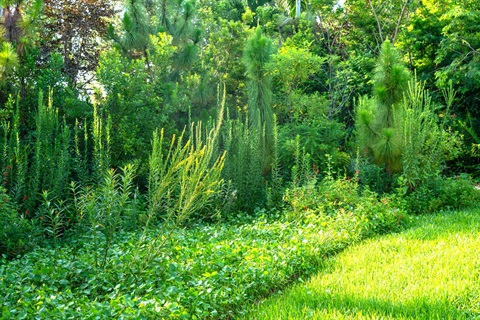Florida-Friendly Yards

Creating a Florida-Friendly Yard is more than just a landscaping trend. It's a commitment to nurturing our environment and preserving the natural beauty of Pinecrest.
The Florida Yards & Neighborhoods (FYN) program, a partnership between the University of Florida/Institute of Food and Agricultural Sciences (UF/IFAS) and various other environmental agencies, addresses the serious problems of pollution in stormwater runoff, water shortages and disappearing habitats by enlisting Floridians in the battle to save our natural resources.
Why It’s Important
Your yard serves as a frontline defense in the preservation of Florida's delicate ecosystems. Rainwater runoff from your property can carry pollutants—like fertilizers, pesticides, animal waste and petroleum products—into waterways or seep into groundwater. Misused residential fertilizers and pesticides present a significant risk to Florida’s water health, with common substances potentially contaminating our water supply and harming both aquatic life and human health. A Florida-Friendly Yard conserves water, reduces waste and pollution, and supports wildlife. By following FYN's nine principles, you'll not only enjoy a vibrant and sustainable garden but also contribute to the well-being of Pinecrest and beyond.
The Nine Principles of Florida-Friendly Landscaping
Right Plant, Right Place: Select plants that naturally thrive in South Florida’s tropical climate to reduce the need for excess watering, fertilizers and pesticides. Native plants are already adapted to local conditions, so they're more likely to thrive with less maintenance. Learn about Pinecrest’s native plant movement.
Water Efficiently: Smart watering isn't just about when you water your yard, but also how much and what methods you use. For example, methods like properly-monitored drip irrigation delivers water directly to plant roots, reducing waste. Collecting rainwater in barrels is another great way to make the most of natural rainfall. And remember, watering deeply but less frequently encourages plants to develop deeper root systems, making them more drought-resistant.
Fertilize Appropriately: Over-fertilizing can harm our ecosystems, especially sensitive areas like Biscayne Bay. When you do fertilize, opt for slow-release and organic fertilizers that feed plants gradually and reduce the risk of runoff. Always follow label instructions carefully to avoid over-application. Also be mindful of the county's seasonal fertilizer ban from May 15 through October 31 to protect our waterways. Learn more about responsible fertilization and its impact on our ecosystem.
Mulch: A layer of mulch does wonders for your garden. It keeps the soil moist, adds nutrients as it breaks down and suppresses weeds. Use organic mulches like melaleuca, pine straw or eucalyptus, which improve soil structure and add beneficial organisms as they decompose.
Attract Wildlife: Your yard can be a sanctuary for wildlife by including a variety of plants that offer food, shelter and nesting sites. Flowering plants attract pollinators like bees and butterflies, while berry-producing shrubs provide food for birds. A birdhouse can help attract feathery friends.
Manage Yard Pests Responsibly: Instead of reaching for chemicals at the first sign of pests, consider eco-friendly options. Introduce beneficial insects like ladybugs to combat aphids, or use neem oil as a natural pesticide. Encourage birds that eat insects by installing birdhouses and birdbaths.
Recycle Yard Waste: Convert your yard trimmings into valuable resources for your garden by composting. Composting helps to reduce landfill waste and also enriches your soil, improving its structure and fertility. Plus, it's a satisfying way to recycle nutrients right back into your yard. Learn about Pinecrest’s free composting program.
Reduce Stormwater Runoff: Techniques like creating shallow rain gardens or shaping the earth on slopes with berms (rises) and swales (dips) can significantly reduce the amount of stormwater runoff from your property. These methods allow rainwater to soak into the ground slowly, filtering it naturally and recharging groundwater supplies.
Protect the Waterfront: If your property borders water, take extra care to preserve these ecosystems by maintaining a buffer zone of native plants along the water's edge, as well as establish a minimum 10-foot "low-maintenance zone," where you should avoid mowing, fertilizing, or using pesticides in that area. This buffer zone not only filters runoff but also provides habitat for aquatic wildlife, helping to keep Florida's waterways healthy.
Learn about irrigation and rain barrel rebate programs.